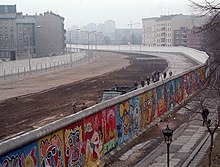
A separation barrier or separation wall is a barrier, wall or fence, constructed to limit the movement of people across a certain line or border, or to separate peoples or cultures.[1] A separation barrier that runs along an internationally recognized border is known as a border barrier.[citation needed]
David Henley opines in The Guardian that separation barriers are being built at a record-rate around the world along borders and do not only surround dictatorships or pariah states. In 2014, The Washington Post listed notable 14 separation walls as of 2011, indicating that the total concurrent number of walls and barriers which separate countries and territories is 45.[2]
The term "separation barrier" has been applied to structures erected in Belfast, Homs, the West Bank, São Paulo, Cyprus, and along the Greece-Turkey border and the Mexico-United States border. In 2016, Julia Sonnevend listed in her book Stories Without Borders: The Berlin Wall and the Making of a Global Iconic Event the concurrent separation barriers of Sharm el-Sheikh (Egypt), Limbang border (Brunei), the Kazakh-Uzbekistan barrier, Indian border fence with Bangladesh, United States separation barrier with Mexico, Saudi Arabian border fence with Iraq and Hungary's fence with Serbia.[3] Several erected separation barriers are no longer active or in place, including the Berlin Wall, the Maginot Line and some barrier sections in Jerusalem.[4]
- ^ "The fence along the Mexican-U.S. border is just one of many barriers proposed or constructed around the world to keep people and cultures separated. Learn more about them below."[1]
- ^ Cite error: The named reference
wpwas invoked but never defined (see the help page). - ^ Cite error: The named reference
sonnevendwas invoked but never defined (see the help page). - ^ David Henley, Walls: an illusion of security from Berlin to the West Bank, The Guardian, November 19, 2013.